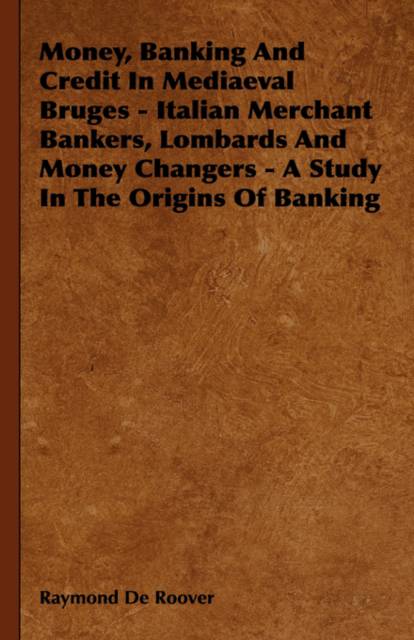
- Retrait gratuit dans votre magasin Club
- 7.000.000 titres dans notre catalogue
- Payer en toute sécurité
- Toujours un magasin près de chez vous
- Retrait gratuit dans votre magasin Club
- 7.000.0000 titres dans notre catalogue
- Payer en toute sécurité
- Toujours un magasin près de chez vous
Money, Banking And Credit In Mediaeval Bruges - Italian Merchant Bankers, Lombards And Money Changers - A Study In The Origins Of Banking
Raymond De Roover
Livre relié | Anglais
73,45 €
+ 146 points
Format
Description
This informative book offers a wealth of information on the origins of banking, and will make an excellent addition to the bookshelf of anyone with an interest in the subject. The book is divided into three main parts: 'The Italian Merchant-Bankers', 'The Lombards Or 'Cahorsins'' and 'The Money Changers', each containing several in-depth chapters. Preface: 'This book is the outcome of my finding a casual reference to the existence of several account books of mediaeval merchants in the Bruges Municipal Archives. For some time I had been interested in the history of accounting and I had delved in the archives of Antwerp, my native city. Antwerp is rich in business records of the sixteenth and later centuries but I had seen no earlier account books. Upon learning of their existence in Bruges I immediately wrote a letter of inquiry to the Curator of the Bruges Archives. The reply was courteous but not encouraging. Yes, there were some mediaeval account books in the Bruges Archives, but the script was nearly illegible and the interpretation of those documents, I was tactfully given to understand, would require the combined talents of a palaeographer, a bookkeeper, and a financier. At that time I knew some bookkeeping and I had worked in a bank, but I could qualify neither as a financier nor as a palaeographer. Nevertheless, undaunted by the difficulties, I made arrangements with the Archivist, Monsieur Remi A. Parmentier, to visit the Bruges Archives and to examine those mysterious and alluring account books. The first visit took place in May 1929. It was followed by many others because Monsieur Parmentier had not exaggerated the difficulties. Several of my short vacations - I was then working in a business office - were spent bending over the huge ledgers of Collard de Marke and Guillaume Ruyelle in the salle du public, where only the carillon interrupted from time to time the archival silence. As the years passed my acquaintance with Monsieur Parmentier grew into a warm and enduring friendship. Not only did he grant me unusual privileges and facilities for research but he introduced me to Professor Egide Strubbe and thus enabled me to publish the preliminary results of my investigation in the Annales de la Societe dEmulation de Bruges. My last visit to the Bruges Archives was in 1938. By that time I had completed my research and had conceived the general scheme of this book. Its completion was prevented for a long time by other duties and when it was finally completed publication was delayed by the War. During all these years Monsieur Parmentier never lost hope. It is only fitting that this book for which he has waited so long be dedicated to him... '
Spécifications
Parties prenantes
- Auteur(s) :
- Editeur:
Contenu
- Nombre de pages :
- 466
- Langue:
- Anglais
Caractéristiques
- EAN:
- 9781443726092
- Date de parution :
- 04-11-08
- Format:
- Livre relié
- Format numérique:
- Genaaid
- Dimensions :
- 140 mm x 216 mm
- Poids :
- 739 g

Les avis
Nous publions uniquement les avis qui respectent les conditions requises. Consultez nos conditions pour les avis.






